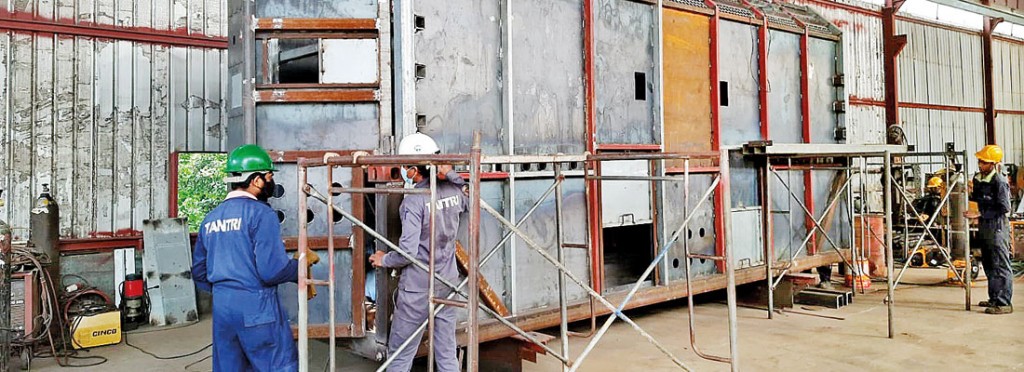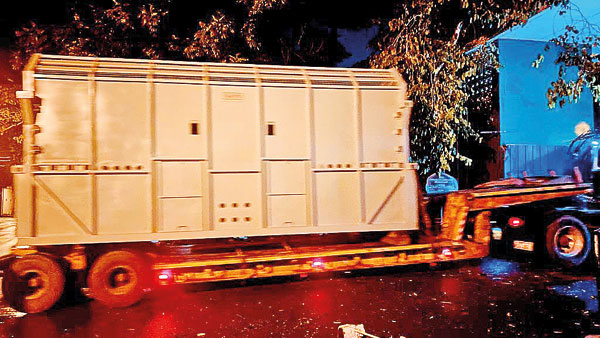News
Sak Surin getting used to specially designed ‘travel abode’ before takeoff to Thailand
View(s):
Thai officials and mahouts at the Dehiwela zoo look on as Sak Surin undergoes training session to get used to the crate
By Kasun Warakapitiya
Thirty-year-old tusker Muthu Raja, also known by his Thai name Sak Surin, is getting ready to be flown back to his home country.
He is currently going through a process of acclimatisation, and is being trained to stay inside the crate he will be transported in, on his flight back to Thailand.
The tusker was gifted to the Sri Lankan government by the Royal Kingdom of Thailand and is being taken back to Thailand due to alleged mistreatment by his previous caretakers at Aluthgama Kande Viharaya.
National Zoological Gardens Director General Thilak Premakantha told the Sunday Times two Thai mahouts were training the tusker to get used to the crate.

The crate under construction
He said the elephant handlers coax him to enter the crate by showing coconut leaves and other food.
Mr Premakantha said the tusker appeared to respond to instructions in Thai language and the language used by local mahouts. His training was proceeding well, Mr Premakantha said.
“There is no use of bull-hooks (henduwa) as the tusker responds to Thai verbal commands and is fond of food placed inside the crate,” Mr Premakantha said.
He said the training sessions last for a few hours and were held when the zoo was closed to the public, to minimise risk to visitors. The training sessions begin around 6 a.m. and around 6 p.m..
The Royal Thai Government, through its embassy, had contacted Tantri Trailer manufacturers based at Biyagama in Kelaniya and had requested a special crate to transport the tusker.

The crate was transported to the zoo at 3 a.m. on Tuesday to avoid disturbing other animals
Milinda Kodagoda, the Research and Development Engineer who designed the crate, said the tusker would be flown back to Thailand in a Russian cargo flight model IL-76. The Thai embassy required a crate built according to international standards, which would be comfortable and secure for the tusker.
“After learning the tusker’s dimensions, we fashioned the crate to be ten and a half feet high, seven feet wide and 23 feet long. The crate has two hinged single and double doors at both ends for easy entrance and exit and sliding doors on the sides to provide food and water,” Mr Kodagoda said.
He also said the crate was designed with adequate ventilation and was also strong enough to hold 1.5 times the tusker’s weight. It also had two tanks at the sides to drain the animal’s waste, according to international standards.
Mr Kodagoda said the metal crate was transported and unloaded at the zoo on Tuesday at 3 a.m. to avoid disturbing the other animals.
He also said the Royal Thai Embassy prepared the training schedule for the animal to become acclimatised to the crate.
“We were told the elephant would be flown back to Thailand on July 2, and our company would be engaged in loading the animal to the container, transporting it to the airport and loading the crate and the tusker onto the flight,” Mr Kodagoda said.
He added that the elephant would undergo more training at the zoo and would be trained to stay inside the crate while it is loaded into a container to be taken to the airport.
Meanwhile zoo officials said they had been notified that the Thai government would quarantine the tusker after he landed. They added that the Thai embassy was constantly having meetings to discuss the process of repatriating the tusker.
They also said when a country agreed to accept an animal without quarantine procedures they were responsible for bringing foreign pathogens into their country.
They claimed the Animal Production and Health Department had not given instructions yet and they were expecting to carry out the quarantine period for at least two weeks, if directed.
| National Zoo Academy and hydrotherapy unit in the works The zoo is planning to set up a hydrotherapy unit to treat ailing elephants and a National Zoo Academy to educate people on elephant handing to enhance the quality of life for captive elephants. National Zoological Gardens Director General Thilak Premakantha said they are planning to set up a hydrotherapy unit at the zoo to treat captive elephants who need medical care. “If we had a hydro therapy unit we could have cured the stiffened leg of Muthu Raja. In future if we face a similar situation we could help the animal recover,” he said. Mr Premakantha said they want to put a stop to the mistreatment of captive elephants by establishing a National Zoo Academy, which would focus on training elephant handlers, through less invasive methods. He said they have already submitted a Cabinet paper seeking approval for the matter. | |
The best way to say that you found the home of your dreams is by finding it on Hitad.lk. We have listings for apartments for sale or rent in Sri Lanka, no matter what locale you're looking for! Whether you live in Colombo, Galle, Kandy, Matara, Jaffna and more - we've got them all!

